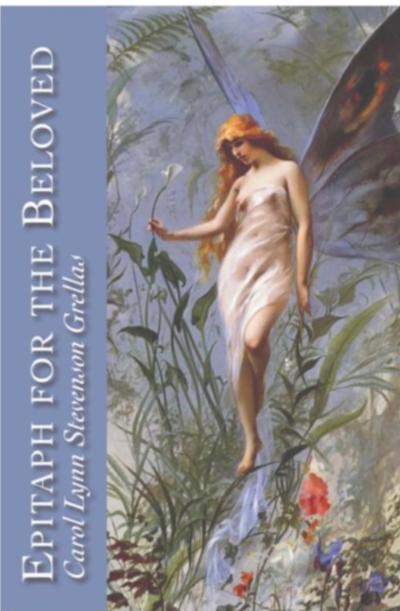California Writers Club 100th Anniversary
2025Finalist
2024VCFA nomination
2021Featured poem issue #57
How To Fall in Love with Robert Bly
Semifinalists: Carol Lynn Grellas
2023Northern Cal Book Award nomination for Epitaph for the Beloved
2020Shortlisted for the Eric Hoffer Award Grand Prize, along with Honorable Mention in Poetry Alice in Ruby Slippers
2021Nomination for the AWP Intro Journals Project Poetry
2021Poetry Finalist
2021Water Goddess
2020Eight in the Morning
James Joyce Nora Have a Heart to Heart in Heaven
A Mall in California
2018In the Making of Goodbyes
2019An Ode to Hope in the Midst of Pandemonium
2018BEFORE I GO TO SLEEP
2012
The 102 poems in Carol Lynn Stevenson Grellas’ Epitaph for the Beloved (Finishing Line Press, 2019) are divided into seven sections, each introduced by a line in the nursery rhyme “Monday’s Child” though the lyrics have been changed from present tense (“Monday’s child is fair of face”) to past tense (“Monday’s Child Was Fair of Face”) and thus we have a history, a looking back on a life, rather than a contemporaneous description of or a prediction of one. One other change is the wording of the last day of the week. “And the child that is born on the Sabbath day / Is bonny and blithe, and good and gay” becomes “But the Child That Was Born on the Sabbath Day, Was Fair and Wise and Good and Gay.” The change seems to be for clarity, though “blithe” and “wise” are nowhere near synonyms and I’m not sure what that comma after “Day” adds to the reader’s comprehension.
The reason I comment on this structure is that in any odd-numbered list there is a middle term as in the fifteen stories in Joyce’s Dubliners. The eighth story in that collection (“A Little Cloud”) is central to the meaning of that book. In this book, the fourth section (Thursday’s Child) is the center, the fulcrum from which all the other poems ascend or descend. The fourth section deals with the dissolution of the speaker’s marriage. Leading up to that section we have poems of childhood, motherhood, and grief, and following that section, we have poems of remarriage, nostalgia, and resolve.
But the poems in this middle section are the most passionate and the strongest in the book with titles like “Womanizer,” “Conman-Duplicitous,” “Sleeping Beauty, Betrayed,” “Detonate” and “The Vibrator,” a poem about the gift that a husband gave a wife with the refrain “you gave me a vibrator.” Here is the savage last stanza:
And here, I would say to you now, is the box
that sits bare and unfilled, which needs
no replacements. Here is the case which you
happened to leave while taking the vibrator
upon our divorce which I never questioned
knowing you’d need it—
far more than I.
The long dash above that separates the last line (“far more than I”) from the rest of the stanza is a typical strategy for many poems in this volume in which the last line is often set off from the rest of the poem, privileging it, investing it with dramatic and significant isolation.
Here are some examples:
Some of Grellas’ word choices are surprising and arresting as when she writes in “Mouse Queen” “you are an enigma of narrowing bones” or in these lines from “Caterpillar Prayers”:
You were a butterfly
in the meadowwhere no viewer
could see your gracesave the birdlike seraph
perched on a nearbymagnolia leaf
At other times, an occasional cliché (“pearly whites”) or a solecism (“laying on a bed”) appears, and every once in a while the language becomes a little precious, a little strained, as in “the air blued and bruised / from lies” [“Conman-Duplicitous”] or “how no / amount of plea undoes the fate / of any willful heart.” [“Breached”]
Still, so much of the diction in these poems is winning.
Dog, I am sorry
that you have gone hungry.
I have been a glutinous[1] fool. [“Wild Thing”]
This is the kind of poem,[2] that will sleep with you
when no one’s looking. [“Bad Poem”]
And so much of the sentiment in these poems is not to be resisted as when Grellas writes of her children, “They are the poems I’ve yet / to write as they will become a part of me / no matter what devastation the world / sends my way” [“If I Should Die before I Wake[3] Remember…”] and also when she writes memorably of herself, “A prelude to ecstasy is all that I ask.” [“Meet Me in the Countryside”]
As a “prelude to ecstasy,” read these poems of face, grace, woe, distance, loving, living, and wisdom, poems where “the moonlight knows your name.”